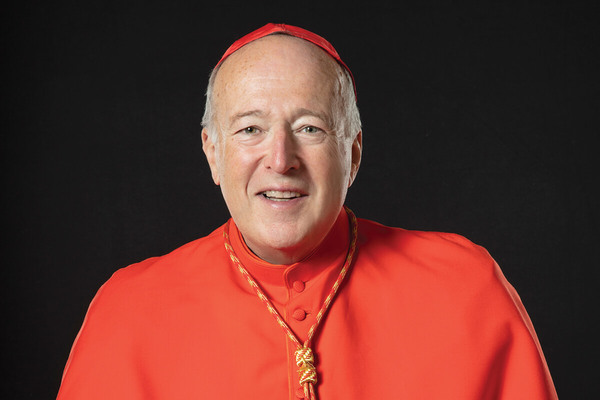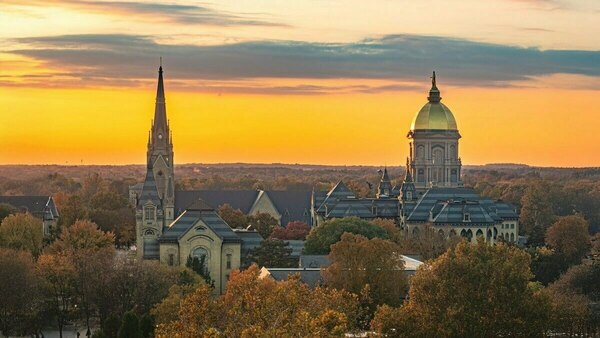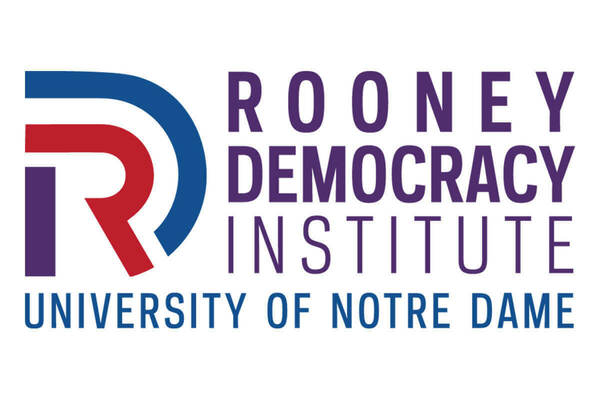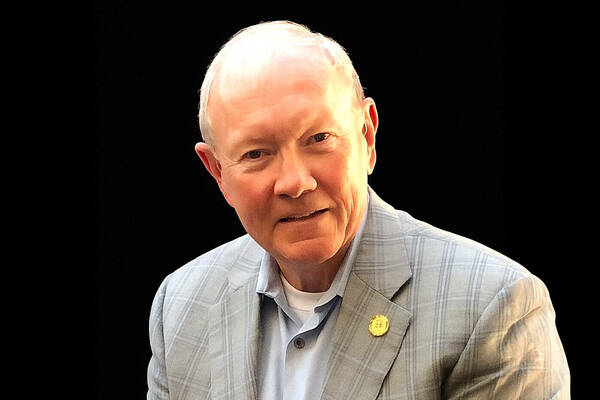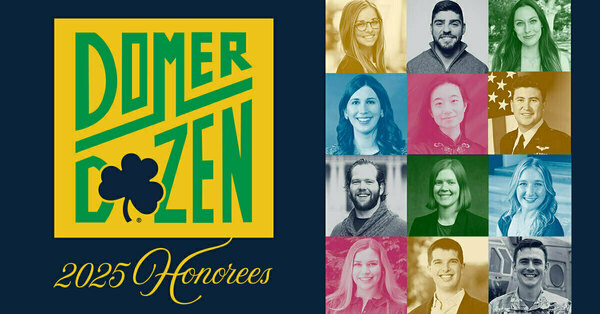Notre Dame Forum panels to explore impacts of Iraq war 20 years later
As part of this year’s Notre Dame Forum on War and Peace, the University of Notre Dame will hold two events exploring the impact and aftermaths of the Iraq war on the occasion of the 20th anniversary of the U.S. invasion.
Hosted by University President Rev. John I. Jenkins, C.S.C., the Notre Dame Forum has been held annually since 2005, with events each year focused on a central theme of particular importance to the University, the nation and the larger world.
The first event, “Aftermaths I: The Invasion of Iraq in Historical Perspective,” will take place from 6 to 7:30 p.m. March 30 (Thursday), while the second event, “Aftermaths II: The Invasion of Iraq in the Present,” will be held from noon to 1:30 p.m. March 31 (Friday). Both discussions will be held in the Eck Visitors Center auditorium, and are free and open to the public. The events will be livestreamed.
Aftermaths I: The Invasion of Iraq in Historical Perspective
A panel of experts, including two journalists from top global publications who covered the war, a historian, and a medical anthropologist, will provide historical perspective on the war in Iraq.
Panelists will include:
Spencer Ackerman — a national security correspondent for outlets such as The New Republic, Wired, The Guardian and The Daily Beast. He reported from the frontlines of Afghanistan, Iraq and Guantanamo Bay, and shared in the 2014 Pulitzer Prize for Public Service Journalism for Edward Snowden’s National Security Agency leaks to The Guardian.
Adrew J. Bacevich Jr. — American historian specializing in international relations, security studies, American foreign policy and American diplomatic and military history. He is professor emeritus of international relations and history at the Boston University Frederick S. Pardee School of Global Studies, and a retired colonel in the Armor Branch of the United States Army.
Omar Dewachi — associate professor of medical anthropology at Rutgers University. His expertise is the intersections of global health, history of medicine and political anthropology. Dewachi’s scholarship focuses on the human and environmental manifestations of decades of conflict and military interventions in Iraq and the broader Middle East.
Rosemary A. Kelanic — assistant professor of political science at Notre Dame, will moderate the event. Her research focuses on international security, coercive diplomacy, energy politics and U.S. grand strategy. Her book, “Black Gold and Blackmail: Oil and Great Power Politics,” explains why countries adopt radically different strategies to secure oil access in case of emergency or war.
Jane Arraf, New York Times Baghdad bureau chief and former CNN Baghdad bureau reporter who covered the war, was scheduled to participate in this discussion. However, due to personal circumstances, she is unable to attend.
Aftermaths II: The Invasion of Iraq in the Present
Iraqi and Iranian authors and artists will discuss the aftermaths of war and peace, and explore how the invasion of Iraq impacts present realities.
Panelists will include:
Salar Abdoh — Iranian novelist and essayist. He is the author of the novels “The Poet Game,” “Opium” and “Tehran At Twilight,” and the editor and translator of the anthology “Tehran Noir.” He is also a director of the graduate program in creative writing at the City College of New York.
Amal Al-Jubouri — Iraqi writer, poet, translator, journalist and publisher. She founded East-West Publishing, whose mission is to introduce works of international literature to the Iraqi literary scene. In 1997, seeking political asylum, Al-Jubouri immigrated to Germany where she launched Al-Diwan, the first and only Arab-German literary magazine.
Mortada Gzar — Iraqi novelist, filmmaker and visual artist. He has written, directed and produced several films that have been screened at international festivals. His animated short film “Language” won the Doha Film Award.
Dunya Mikhail — Iraqi American poet and writer. She is a laureate of the UNESCO Sharja Prize for Arab Culture and her honors also include Arab American Book Award and U.N. Human Rights Award for Freedom of Writing.
Atalia Omer — professor of religion, conflict and peace studies in the Keough School of Global Affairs, will moderate the event. She is a core faculty member of the Kroc Institute for International Peace Studies, and her research focuses on religion, violence and peacebuilding as well as theories and methods in the study of religion and Palestine/Israel. She was a 2017 Andrew Carnegie Fellow resulting in her forthcoming book, “Decolonizing Religion and Peacebuilding.”
For more information, visit forum.nd.edu.
Latest University News
- Cardinal Robert McElroy, archbishop of Washington, DC, to speak at Notre Dame Forum event on ‘Healing Our National Dialogue and Political Life’Cardinal Robert McElroy, archbishop of the Archdiocese of Washington, D.C., will join University President Rev. Robert A. Dowd, C.S.C., for a conversation titled “Healing Our National Dialogue and Political Life” at 4 p.m. Friday (Oct. 17) in Room 215/216, McKenna Hall, as part of the 2025-26 Notre Dame Forum on the theme “Cultivating Hope.” This event is free and open to the public.
- Notre Dame’s Kellogg Institute partners with Vanderbilt University to launch 2025-26 democracy surveyThe University of Notre Dame’s Kellogg Institute for International Studies and Vanderbilt University’s Center for Global Democracy are partnering to advance one of the world’s leading surveys on attitudes toward democracy. Starting in October, the Center for Global Democracy, with support from the Kellogg Institute, will conduct the 2025-26 round of the AmericasBarometer, which tracks public opinion on democracy in 20 countries across the Americas.
- Francis and Kathleen Rooney make transformative gift for Notre Dame institute focused on democracy research and educationFrancis and Kathleen Rooney of Washington, D.C., and Naples, Florida, have made a gift to the University of Notre Dame to endow an institute in the College of Arts & Letters committed to the preservation of American democracy through research, teaching and public engagement. The Rooney Democracy Institute, formerly known as the Rooney Center for the Study of American Democracy, aims to advance Notre Dame’s role as a national and global leader in democracy scholarship and as a convener of bipartisan conversations about the future of democracy.
- Gen. Martin Dempsey to speak at Notre Dame Forum event on ‘Hope, Global Stability and the Role of the United States’Gen. Martin Dempsey, the retired 18th chairman of the Joint Chiefs of Staff, will join University President Rev. Robert A. Dowd, C.S.C., for a fireside chat at 4 p.m. Friday (Oct. 10), as part of the 2025-26 Notre Dame Forum. The discussion, titled “Hope, Global Stability and the Role of the United States,” is part of the exploration of this year’s Notre Dame Forum theme, “Cultivating Hope.” It will take place in Rooms 215/216 of McKenna Hall and will also be livestreamed. The event is free and open to the public.
- University of Notre Dame joins the Global Coalition of Ukrainian StudiesThe University of Notre Dame has joined the Global Coalition of Ukrainian Studies after signing a memorandum of cooperation, formalized Sept. 24, at the Ukrainian Institute of America in New York City. Notre Dame joined four other American institutions that were also publicly welcomed to the coalition at this event: Arizona State University, Columbia University, Manor College and the Shevchenko Scientific Society.
- Alumni Association and YoungND honor 2025 Domer DozenThe Notre Dame Alumni Association announced its 2025 Domer Dozen cohort, honoring 12 graduates ages 32 and younger for excellence in their contributions in learning, service, faith and work — the core pillars of the association’s mission.








